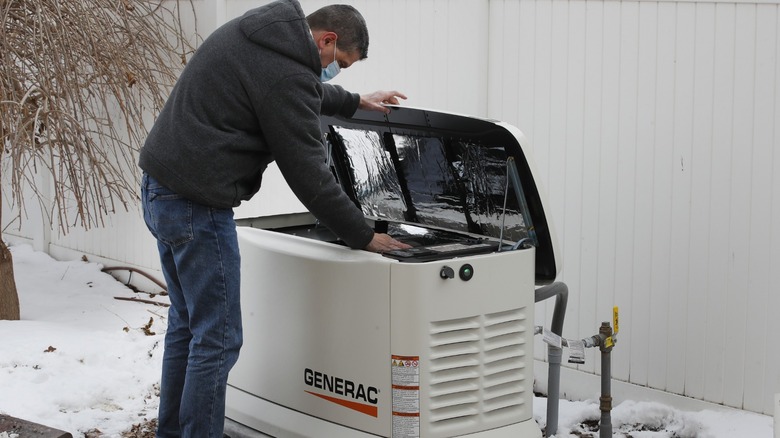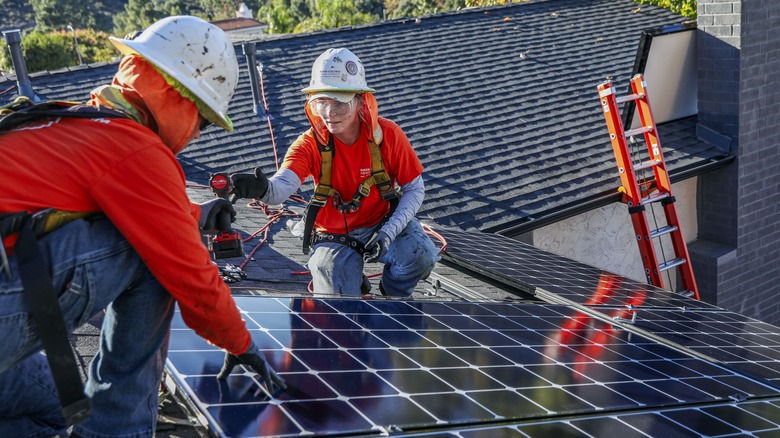Will A Whole Home Generator Ever Pay For Itself?
A home generator can be a lifesaver when the power goes out. With more extreme weather conditions increasing the frequency of power outages, it's not a bad idea to install one in your home. But can a generator pay for itself in the long run? The answer depends on how you use it.
Home generators are pretty expensive, with most whole-house models exceeding $5,000 dollars and some reaching $25,000 and above. You'll likely also have to shell out more cash to get it installed, especially if it needs a hookup to the gas line. Of course, the expenses rise even further once you account for fuel and maintenance.
Thus, it's unlikely that a home generator will pay for itself over time. Founder of Direct Energy Don Whaley put it plainly in a 2024 interview with CNET: "It's unlikely that the system will ever pay for itself based on electricity produced versus the cost of electricity from the grid." However, there are several variables to consider when calculating the return on investment, and some aren't as obvious as you might think. For example, the type of fuel you use, the amount you use it, and the climate where you live will play a big role in getting your money's worth.
How to calculate the cost-value of a home generator
After adding up the initial expenses of the generator, the fuel, installation, and maintenance, you will have a baseline figure for the cost of your investment. Whole-house generators cost anywhere from $5,000 to $18,000 and above, while small portable generators come at around $1,500 to $6,000 with installation.
First, decide what type of home generator to buy. Most are fueled by either propane or gasoline. Propane and natural gas generators are typically more expensive up front, more fuel-efficient, less polluting, and less noisy. On the other hand, gasoline generators are typically cheaper up front, less fuel-efficient, noisier, and more polluting. Thus, folks who use their generator frequently may save more money on fuel in the long run with a propane-powered generator, even though the initial cost is greater. A gasoline powered generator is more cost-efficient for those who need a simple backup for infrequent emergency situations.
Large-scale generators are often fueled by diesel, though there are some excellent portable diesel designs, too. Permanent installations can cost a bundle, and diesel itself is pretty expensive. Diesel generators are considered the most fuel-efficient, however, since you can get a lot of power out of a relatively small amount of fuel.
You can place your own value on having an off-the-grid power source in an emergency. This is subjective, and it comes down to how important electricity is to the well-being of you and your family. Some people rely on medical instruments, like sleep apnea machines, dialysis systems, and ventilators, which require consistent power. Others may need electricity for their livelihoods to power things like refrigerators and servers. Ultimately, you likely won't see a full return on investment, but the value of a home generator isn't just in its price tag.
Are there cheaper alternatives to home generators?
Each type of generator technology has its advantages and disadvantages, so choosing an alternative depends on your needs and budget. A whole-home fuel-powered generator can be an expensive investment and will likely cost several thousands of dollars. Plus, because they are only useful during power outages, they can't reduce your electricity bill.
Solar panels provide off-the-grid electricity as well, but they can pay for themselves over time by selling excess power back to the grid. Unfortunately, power outages usually occur during extreme weather conditions when sunlight is scarce. You can counter this obstacle with solar batteries, but such storage systems are currently pretty expensive. Storing enough power for a whole home with solar batteries can cost between $7,000 and $14,000. Nonetheless, solar is the best move for those looking for an independent, clean power source that can eventually pay for itself over many years.
For those with frequent power outages or extreme climates, a gas-powered generator is your best bet. They won't exactly pay for themselves, but the intrinsic value in a potentially life-saving power source doesn't have a dollar value. The cheapest is a gasoline-powered backup generator, which will keep your phone charged and your lights on in a pinch. You can also combine a small-scale home generator with some solar panels to ensure you have full coverage at a more modest cost.


